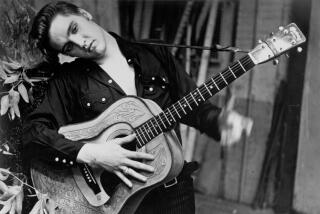Art, deep as memory / At the holidays, the arts become especially personal, shot through with ritual and family tradition. On these pages, six encounters with words, images and music that left their mark on our writers.
- Share via
Although Christmas music has proliferated over the past couple of decades, the anti-carol has become a genre unto itself, seeking to tweak the standard sentiments of religious devotion, warm conviviality and fuzzy nostalgia .
There are satires (Stan Freberg’s groundbreaking “Green Christmas”), there’s the whole “Blue Christmas” subgenre, and with punk and its aftermath came anarchic and ironic takes (Sonic Youth’s “Santa Doesn’t Cop Out on Dope” and Beck’s “Little Drum Machine Boy,” respectively).
But with the exception of the startlingly cynical Freberg record, these digs at the Christmas spirit tend to be mild correctives that don’t seriously threaten the season’s foundations.
That’s why I always reserve an airing of William S. Burroughs’ “The Junky’s Christmas” for the inevitable moment each year when the yuletide treacle count reaches critical levels. This 15-minute reading of the iconoclastic author’s short story is so astringent and remorseless that it seems to suck the glucose clean out of your tissue.
The visionary writer and philosopher, who died in 1997, was the Damon Runyon of the underbelly, and “The Junky’s Christmas,” published in his 1987 book “Interzone” and recorded for his 1993 words-with-music album “Spare Ass Annie and Other Tales,” is a masterpiece of lean, precise storytelling.
Its account of Danny the Car Wiper’s search for a fix during a long Christmas Day, with its colorful street characters, plot twists (such as the nasty surprise in an abandoned suitcase) and vivid sense of Manhattan’s topography, would make a great Tarantino short -- though it would compete with the fine clay animation interpretation by director Nick Donkin, which is viewable on YouTube.
“It was a clear bright day but there was no warmth from the sun,” Burroughs says at the beginning, setting the tone for Danny’s odyssey. Later, two characters “looked at each other with the hatred of disappointment,” and his descriptions of the symptoms of “junk sickness” bespeak his own extensive experience with heroin.
His reading is steely eyed and coldly appraising, with no judgment or defense. But there’s a vein of sympathy detectable in his phlegmy voice, and the narrative is enhanced by the music of the hip-hop duo the Disposable Heroes of Hiphoprisy. Their funk riffs propel the story like a blaxploitation score, and their bits of Bach, “The Nutcracker” and carols provide a counterpoint to the bleak story.
Burroughs (who recorded an earlier version of the story with guitar accompaniment by Kurt Cobain) has crafted a true alternative to Christmas iconography while bestowing the season’s blessings on the outcasts and loners usually denied them. It’s a grim world, but he’s not trying to spoil anyone’s fun -- he’s just pointing out that some people have a different route to comfort and joy.
As subversive as it is, in the end it turns on an act of heroic sacrifice. And on this occasion anyway, Burroughs is no nihilist. That gesture is rewarded with a mystical gift, and as Burroughs describes the transfiguration of Danny the Car Wiper, you can almost see the twinkle in the old curmudgeon’s eye.
--
More to Read
The biggest entertainment stories
Get our big stories about Hollywood, film, television, music, arts, culture and more right in your inbox as soon as they publish.
You may occasionally receive promotional content from the Los Angeles Times.










